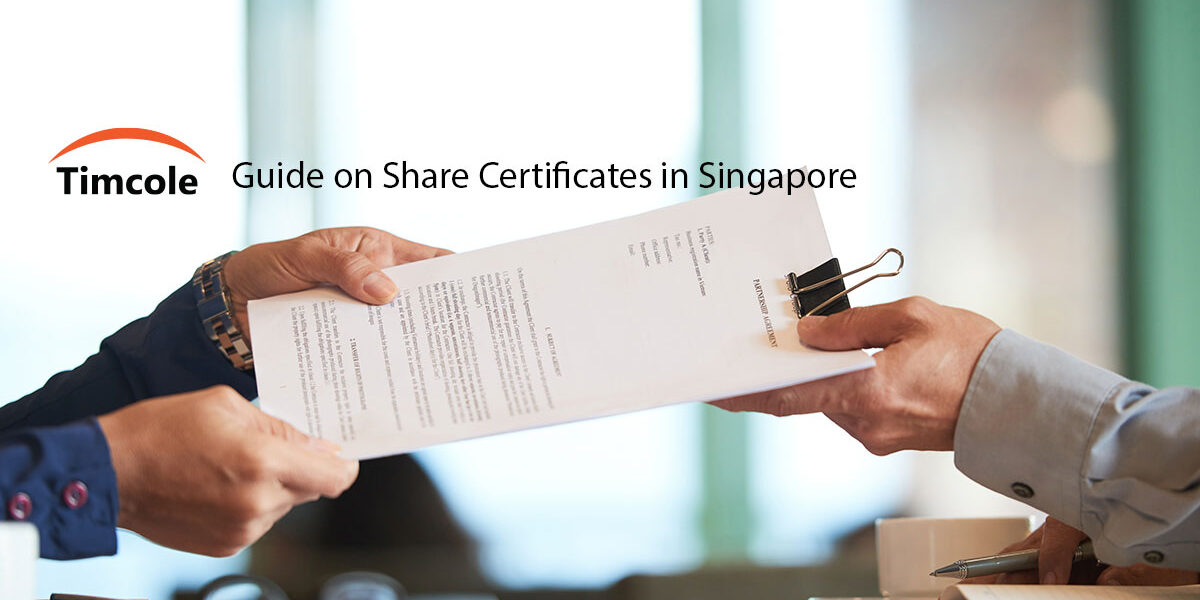When you purchase shares in a company, you become a shareholder. Companies issue share certificates to shareholders as proof of membership. The certificate states essential information such as the number of shares issued and the date of issuance.
Only private limited companies issue share certificates. Publicly-listed companies issue share certificates electronically, which are then moved to the shareholder’s Central Depository account.
In Singapore, it is the Company Secretary’s responsibility to issue share certificates. Each of the certificates will feature a unique number that must be recorded in the members or registrar. Moreover, share certificates must have signatures from two company directors. If a company only has one director, the share certificate must be signed by the director and the company secretary.
Generally, share certificates are issued under the official seal or common seal of a company. Each certificate should also feature the following details:
- Date of certificate issuance
- The company name or authority
- The company’s registered address or branch office address in Singapore
- The share class stating whether it is wholly paid, partially paid, or unpaid shares
Since 31 March 2017, Companies and Limited Liability Partnerships do not need to use the common seal. An authorized person’s signature is sufficient for the share certificates.
Share certificates are issued during company incorporation in Singapore. Subsequently, certificates are issued during both share allotment and transfer.
Companies often distribute the shares, which can then be sold to existing or new shareholders. This is called allotment of shares which results in increased issued and paid-up shares – and therefore increases the share capital. According to the Singapore Companies Act Section 161, approval from the board of directors is mandatory before the company’s shares can be distributed.
The Company Secretary must record the share allotment by preparing a Director’s Resolution in Writing (DRIW). Furthermore, he is expected to lodge the allotment record as ‘return of allotment’ with ACRA within 14 days. After that, the Company Secretary may prepare the new share certificates. It is to be noted that the shares must be issued within a certain time limit after the lodgement with ACRA is completed.
🖋️ A shareholders’ agreement provides written assurance to both parties. Read the importance of a shareholders’ agreement.
💵 Transferring not just shares but the whole business? Read our guide on how to transfer business ownership in Singapore.
Every shareholder has the option to transfer or sell their title or share back to the company or someone else. They may sell or transfer the shares wholly or partly. There are several reasons why the transfer of shares occurs.
No matter the reason, the Company Secretary must record details of this transfer by preparing a DRIW and arrange IRAS’ stamp duty acknowledgement. Then, the secretary can proceed with transfer lodgement to ACRA, cancel existing certificates, and prepare new share certificates. Similar to share allotment, share transfer also has a time limit after lodgement with ACRA is completed.
Return of allotment must contain information such as number of allotted shares, number of shares held by members of the company, classification of shares, and amount paid. It should also have shareholder details such as full name, address, nationality, and identification.
The Companies Act states that the time limit for the share certification completion and delivery in case of allotment of share is 60 days. The time limit for the transfer of shares is 30 days from the ACRA lodgement date. Failure to abide by the time limit will be considered an offence. Both the company and all its employees will be held accountable and a fine penalty of a maximum S$1,000 may be imposed in addition to a default penalty.
🚫 Penalties are imposed when companies fail to comply to the set regulations. Read the penalties involved when one fails to hold AGM or file Annual Returns.
Destroyed or Lost Certificates: What Can You Do?
In case you lose or destroy your share certificate, the Company Secretary can give you a duplicate copy. The duplicate can only be issued after a statutory declaration is made stating that the share certificate has been lost or destroyed, and not disposed of in any other way.
If your share certificate was over $500 in value, you might be requested to place a newspaper ad stating the certificate is destroyed or lost and you intend on applying for a new copy. The Company Secretary will prepare a DRIW to record the certificate replacement and declare that the first copy is void after the issuance of the duplicate.

A Company Secretary serves an important role in the company. From issuing share certificates to holding Annual General Meeting (AGM), the secretary manages all the necessary administrative work.
Timcole has years of experiences serving as a Corporate Secretary for SMEs in Singapore. Learn more about our secretarial services.








